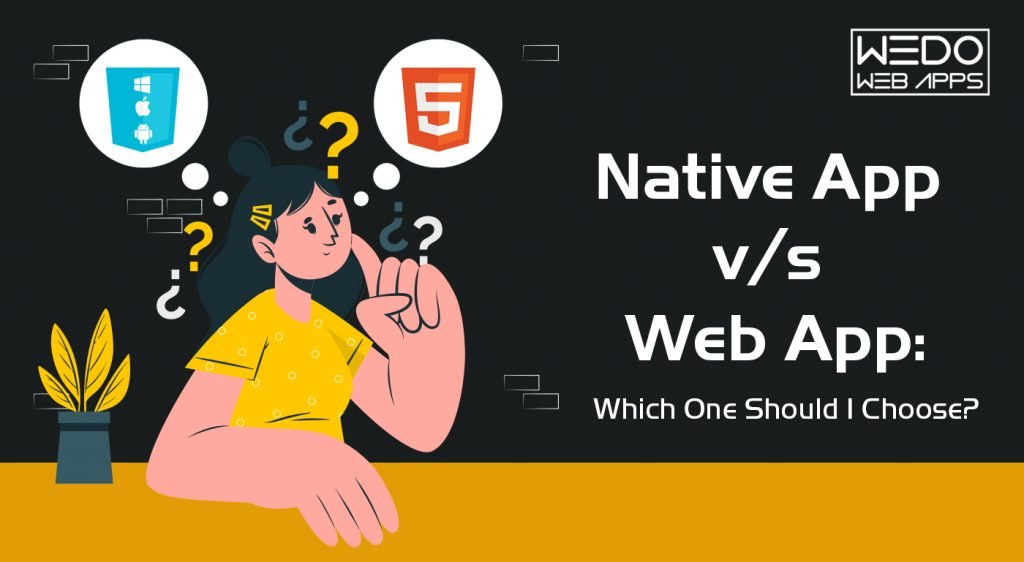29 May, 2022 | Mobile App Development
Native App v/s Web App: Which One Should I Choose?

What are Web Apps?
Web App is the compiled version of the website designed with the help of HTML/CSS and JavaScript that runs in your browser. Once you click on the App downloaded on your device. However, they work only in the presence of the Internet.What are Native Apps?
Native mobile apps are typical mobile applications that you download from the play store/app store on your mobile device. Their design layout can be customized. During testing, you will have the exclusive SDKs for your Android/iOS version that you can test & have published on the play store/app store.Let's consider the differentiating factors between the two mobile app variants one-on-one:
- Operational requirement: The space in your mobile device & installed App from the play store/app store is all you need to run a native mobile app. Internet connectivity is not compulsory but can be mandatory for the usage of certain specific features. Unlike native apps, web apps are hosted on the webserver. To run any web app on your mobile, you need an internet connection. The loading speed of web apps will be biased with the strength of the internet connection.
- Performance: Once the native App is installed on your device, the design elements & content is all stored on the device. You can fetch it as and when required from the APIs, which ensures fair processing speed even when you are not connected with the Internet. In contrast, the performance of web apps is compromised based on network connectivity. The data is fetched from the server in the form of a web page as HTML powered UI for web apps. This ensures the reduced processing speed of the web apps. If your app requirement is speed-dependent then, native apps can only help you acquire success with app development.
- Security: With the increase in online fraud, security is considered one of the crucial factors while selecting the type of mobile App you need for your business. When we compare the two, native apps are more secure than web apps since web apps are designed with non-standard programming codes that efficiently run on the web. In comparison, native apps are known to deploy the device's security features along with the OS updates that boost the performance & aids the security of the App. The device security features like that of the passcode, fingerprint sensor, retina detector help you keep control of the online/offline frauds via apps.
- Scalability & enhancement: For native apps, you think of the feature & a native app development company can have it designed for you. The updates are easy to make & without any restrictions, you can revise your native mobile App with as many features as you like to offer. The native apps are scalable & their UI can be enhanced as per the user's demand or industry requirements. On the other hand, web apps can only enable the features acceptable in the web version provided by web browsers. If you are planning a static app or simply the web version of your website in terms of ease of accessibility, web apps can be your choice; else, native mobile apps are best.
- Usability of mobile features: When you click on the web app, it will open the web version of your website in the mobile application format. This limits the usage of mobile's features for web apps. Conversely, native mobile apps are installed on the device. Thus, they have accessibility to the features of mobile devices like camera, passcodes, security sensors, microphone, GPS, etc. Using these features, numerous challenges can be called off & handled with utter ease.Read more about Web Development Companies in Melbourne and iOS App Development Australia
Frequently Asked Questions
A native app is a mobile application designed specifically for a particular platform, such as iOS or Android. Native apps are built using programming languages and development tools that are specific to that platform. For example, an iOS app would be built using Swift or Objective-C, whereas an Android app would be built using Java or Kotlin. Native apps can be downloaded from an app store and installed on a user’s device.
A web app is a mobile application that is accessed through a web browser. Web apps are built using standard web technologies such as HTML, CSS, and JavaScript. They can be accessed on any device with a web browser, including desktops, laptops, tablets, and smartphones. Unlike native apps, web apps do not need to be downloaded and installed on a user’s device.
High performance: Native apps are specifically designed for a particular platform, which means they can take advantage of the platform’s hardware and software capabilities. This results in a high level of performance and responsiveness. Access to device features: Native apps can access all of the device’s hardware features such as the camera, microphone, GPS, and accelerometer. This allows developers to create apps that are more interactive and engaging. Better user experience: Native apps are designed to look and feel like they belong on a particular platform, which creates a better user experience. Users are more likely to enjoy using an app that looks and feels familiar to them.
Cross-platform compatibility: Web apps can be accessed on any device with a web browser, which means they can be used on a wide range of devices, including desktops, laptops, tablets, and smartphones. No installation required: Web apps do not need to be downloaded and installed on a user’s device, which makes them more accessible and easier to use. Easier to update: Web apps can be updated instantly without the need for users to download and install a new version. This makes it easier for developers to fix bugs and add new features.
The decision of whether to develop a native app or a web app ultimately depends on the unique needs of your business. If you need an app that takes advantage of the device’s hardware and software capabilities, a native app may be the best choice. On the other hand, if you need an app that can be accessed on a wide range of devices, a web app may be the better choice.

